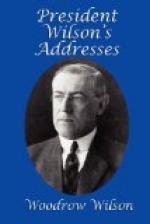But in spite of all these resemblances to older authors, Mr. Wilson gives proof in his style of a masterful independence. He is constantly determined to think for himself, to get to the bottom of his subject, and finally to express the matter in terms of his own personality. Especially is this evident in his early works, where he struggles manfully to be himself, even in the choice of words and phrases, weighing and analyzing the most current idioms and often making in them some thoughtful alteration the better to express his exact meaning. His literary training appears to have been almost wholly English. There are few traces in his writings of any classical reading or of any first-hand acquaintance with French, German, or Italian authors. And indeed in the substance of his thought I wonder if he is sufficiently hospitable to foreign ideas, especially to the vast body of comment on the French Revolution. I imagine few Continental authorities would agree with him in his comparatively low estimate of the importance of that great movement, which he seems to regard with almost unmitigated disapproval.
In Mr. Wilson’s addresses and public letters concerning the War he re-affirms his principles and applies them with high confidence to the fateful problems of this time. His tone has become vastly deeper and sounder since he made his great decision, and from his Speech to Congress, on February 3, 1917, to his recent Baltimore appeal, it has rung true to every good impulse in the hearts of our people. His letter to the Pope is in every way his master-piece, in style, in temper, and in power of thought. He has led his country to the place it ought to occupy, by the side of that other English democracy whose institutions, ideals, and destiny are almost identical with our own, as he has demonstrated in the writings of half a lifetime. Let us hope there was prophetic virtue in a passage of his Constitutional Government, where, speaking of the relation between our several States and the Union that binds them together, he says they “may yet afford the world itself the model of federation and liberty it may in God’s providence come to seek.”
No one can rise from a perusal of the great mass of Mr. Wilson’s writings without an almost oppressive sense of his unremitting and strenuous industry. From his senior year in college to the present day he has borne the anxieties and responsibilities of authorship. The work has been done with extreme conscientiousness in regard to accuracy and clearness of thinking and with sedulous care for justness and beauty of expression. It might well crown a life with honor. And when we remember the thousands of his college lectures and the hundreds of his miscellaneous addresses which have found no record in print, when we recall the labors of university administration which crowded upon him in middle life, when we consider the spectacle of his calm, prompt, orderly, and energetic performance of public duty in these latter years, our admiration for the literary artist is enhanced by our profound respect for the man.[A]




